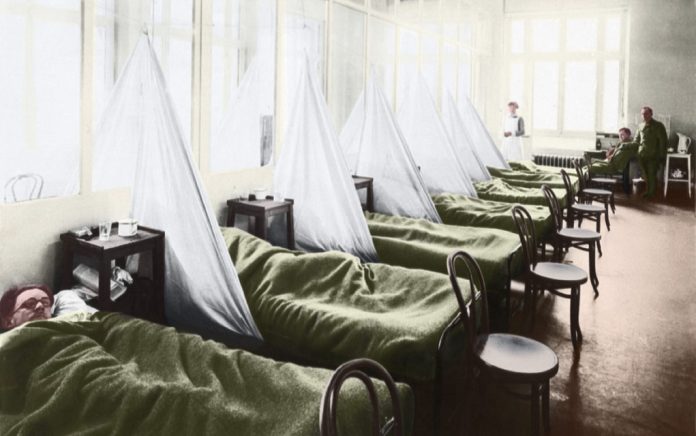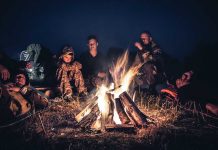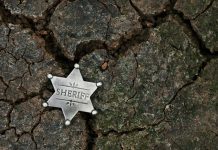(SurvivalDaily.com) – The Spanish Influenza of 1918 is the most severe pandemic in modern history. It claimed the lives of over 50 million people around the globe in its two-year run. In the United States alone, the disease sent over 650,000 people to the grave. Ultimately, it infected over 300 million people — roughly one-third of the world’s population at the time.
The disease was unusual as it attacked healthy individuals as well as the at-risk. It had high mortality rates in those 5 years old and below, 20 – 40-year-olds, and those who were 65 and up. It lasted through three waves before finally ending in 1919.
So, what can we learn from this time in history that can be used in the current fight against the coronavirus pandemic?
Travel Spreads the Disease
Initially, the virus appeared in Europe, America, and Asia before quickly spreading to the rest of the world.
When the Spanish Flu began its assault on the globe, the world was in the midst of World War I. As can be expected with such a widespread conflict, people were on the move. As soldiers and civilians alike traveled, so did the virus.
According to the Centers for Disease Control and Prevention (CDC), more people died of the disease than the total of all who perished in battle during the Great War. American soldiers packed into ships and trains, which spread the virus quickly. Ultimately, it infected 36% of the American Army and 40% of the Navy.
This goes to show that isolation is a key component in controlling the spread of any infectious disease. The Spanish flu took the world by storm because people were migrating from country to country due to the Great War. Had WWI not been a contributing factor, the virus may not have had the impact that it did.
Avoid Large Gatherings
On September 18, 1918, Philadelphia hosted the Liberty Loan parade to boost morale and sell government bonds to fund the war effort. Marching bands played and soldiers marched down Broadstreet to entertain the masses. It is estimated that over 200,000 people attended the event.
This massive crowd proved to be the perfect breeding ground for influenza. In the span of three days, each bed within the 31 hospitals in the city was occupied. By mid-October, over 4,500 people had passed from the disease or its complications.
The Liberty Loan parade is the perfect example of why holding large gatherings of people during a viral outbreak is a bad idea. Had Philadelphia’s public health director, Wilmer Krusen, canceled the event in light of the concerns expressed by other health officials, thousands of lives could have been saved.
Governments Lied
The term “Spanish Flu” was not given to the pandemic because the virus originated there. It did not. The disease was given this name because Spain was one of the only countries not embroiled in World War I (it was neutral), thus, had a free media.
Wartime censorship in Allied and Axis countries led to the suppression of accurate information in order to keep morale high and not put any suspicions on their military readiness. As Spain was the only country reporting true numbers from the onset, it was assumed it was the epicenter of the virus.
Those countries engaged in the war went to great lengths to conceal the severity of the pandemic. Outright lies and disinformation were used to manipulate the masses, once again to keep morale high in the war effort. This was obviously dangerous as it led to people not taking the necessary precautions to avoid spreading the illness.
Regarding the current novel coronavirus pandemic, one can only wonder how much vital information the Chinese Communist Party (CCP) suppressed. Having more early information available could have saved lives. Nearly everything the CCP has released on the virus so far is suspect, from the real numbers of infections and death to the actual origin of the disease.
In Conclusion
The Spanish Flu was a horrific disease that took the lives of far too many people. By learning from the mistakes of those who held positions of power at that time, we can reduce the impact of the current COVID-19 pandemic. Thankfully, once the severity of the virus was known, swift action has prevented it from spreading as far and wide as it could have.
Avoid traveling if at all possible, stay away from large groups of people, and try to stay informed with accurate information if you can. Oh, and wash your hands and wear a mask when out in public.
Copyright 2020, SurvivalDaily.com

















